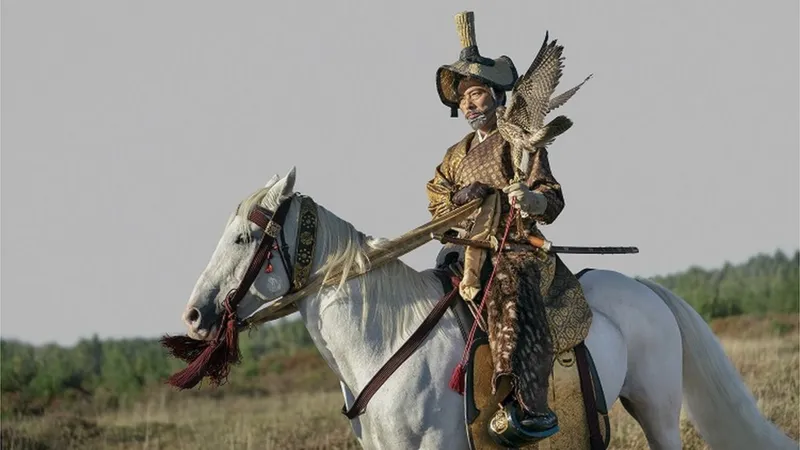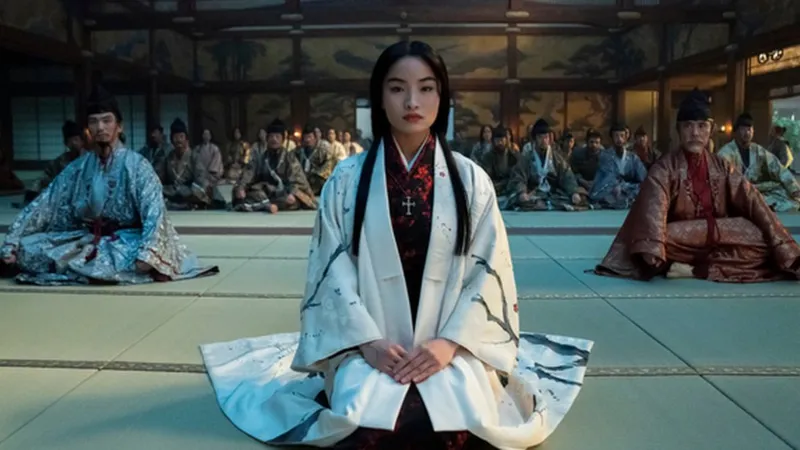Shogun: A guide to the hit Japanese samurai epic as its finale cuts deep
 Shogun, the gripping samurai saga that has captivated audiences with its depiction of feudal Japan, concluded its run on Tuesday after enthralling viewers since February. Here's a comprehensive overview of the acclaimed series available on Disney+ in the UK, along with speculation about what lies ahead now that the concluding episode has aired.
Shogun, the gripping samurai saga that has captivated audiences with its depiction of feudal Japan, concluded its run on Tuesday after enthralling viewers since February. Here's a comprehensive overview of the acclaimed series available on Disney+ in the UK, along with speculation about what lies ahead now that the concluding episode has aired.
What's Shogun about?
Set amidst the turmoil of civil unrest in early 17th century Japan, the series draws inspiration from James Clavell's renowned 1975 novel and the popular 1980 TV adaptation starring Richard Chamberlain.
Rachel Kondo and Justin Marks, the creators, skillfully compress Clavell's sprawling narrative into 10 episodes, faithfully capturing the essence of life in a feudal society governed by daimyō lords and their devoted samurai.
This rendition injects a much-needed cultural authenticity into the source material, as it delves into the power struggles within Japanese society. We follow John Blackthorne (played by Cosmo Jarvis), an English navigator presumed shipwrecked, as he becomes embroiled in the intricate political machinations of Lord Yoshi Toranaga (portrayed by Hiroyuki Sanada), a revered but secluded samurai striving to secure his position as Shogun, the ultimate military ruler.
Its intricate power dynamics have drawn comparisons to Game of Thrones and Succession, albeit without the fantastical elements of dragons and corporate conflicts in sleek modern offices.
What if history isn't my thing?
The series begins with the death of Japan's former leader, Toyotomi Hideyoshi, setting the stage for the power struggle depicted in Shogun. Concurrently, tensions in Europe play a significant role, leading to the presence of priests and missionaries in Japan throughout the narrative. England's split from the Catholic church to embrace Protestantism sparked conflict with Catholic Spain. King Phillip II of Spain, desiring to expand his influence to Japan, allied with Portugal to bolster his efforts, eventually becoming their monarch as well.
England's split from the Catholic church to embrace Protestantism sparked conflict with Catholic Spain. King Phillip II of Spain, desiring to expand his influence to Japan, allied with Portugal to bolster his efforts, eventually becoming their monarch as well.
According to Thomas Donald Conlan, a professor at Princeton University specializing in East Asian Studies and History, the European powers sought to spread Christianity in Japan, often targeting influential lords as part of their strategy.
What have the critics said?
Critics have universally lauded the series for its ambitious scope, top-notch production values, and faithful portrayal of Japanese history and culture. Allison Herman of Variety hailed it as "thrillingly transportive event TV," while the show holds an impressive 99% critical approval rating on Rotten Tomatoes.
Rebecca Nicholson of The Guardian described it as "peacocking, mesmerising television," cautioning that it requires careful attention due to its mix of Japanese and English dialogue. Despite its focus on political intrigue, critics praised its blend of gore, deceit, and romance.
Anita Singh of The Telegraph praised the series for immersing viewers in a foreign world filled with rituals and violence, awarding it four stars. Camilla Long of The Times was won over by Cosmo Jarvis' performance as Blackthorne, despite initial reservations, comparing his presence to that of five Richard Burtons.
The majority of the cast being Japanese was highlighted by Daniel Chin of The Ringer, who commended the series for avoiding the "white saviour narrative" often present in similar narratives. Co-creator Rachel Kondo emphasized the importance of using limitations and strictures to empower characters and make statements about their beliefs and lives.
Nick Hilton of The Independent awarded the series five stars, praising its authenticity and describing it as a brave retelling of a complex tale drawn from Japanese history and Clavell's extensive knowledge of the country. While acknowledging inevitable comparisons to Game of Thrones, Hilton concluded that subtlety and cleverness can be equally exciting.
Is the finale better than Game of Thrones?
 Shogun's success stands in stark contrast to the heavily criticized finale of HBO's Game of Thrones. Ed Power of The Telegraph, awarding Shogun four stars, pointed out the lessons that other showrunners could learn from it. While Game of Thrones focused on spectacle in its final episodes, resulting in visually stunning but emotionally hollow outcomes, Shogun took a different approach, maintaining a more fulfilling trajectory.
Shogun's success stands in stark contrast to the heavily criticized finale of HBO's Game of Thrones. Ed Power of The Telegraph, awarding Shogun four stars, pointed out the lessons that other showrunners could learn from it. While Game of Thrones focused on spectacle in its final episodes, resulting in visually stunning but emotionally hollow outcomes, Shogun took a different approach, maintaining a more fulfilling trajectory.
However, not all reviewers were as impressed. Forbes' Erik Kain expressed mixed feelings about Shogun for the first time, particularly lamenting the absence of climactic battle sequences.
Will there be another series?
While a continuation of Shogun with original material isn't on the cards, it's not entirely out of the realm of possibility, especially considering its impressive global premiere viewership across various streaming platforms.
With the streaming landscape becoming increasingly competitive and the allure of successful spin-offs like The White Lotus, there may be temptation to explore further narratives within the Shogun universe. However, creating such lavish television comes with a hefty price tag, and considering Disney's recent challenges, any potential expansion may face obstacles.








































